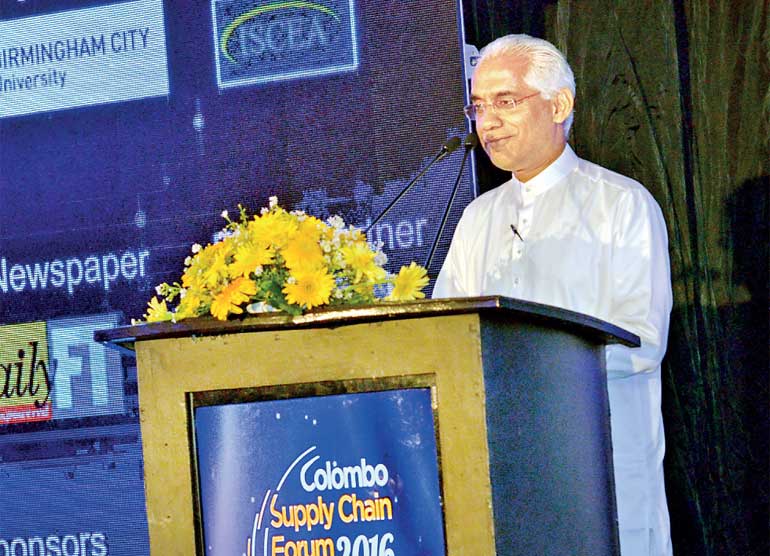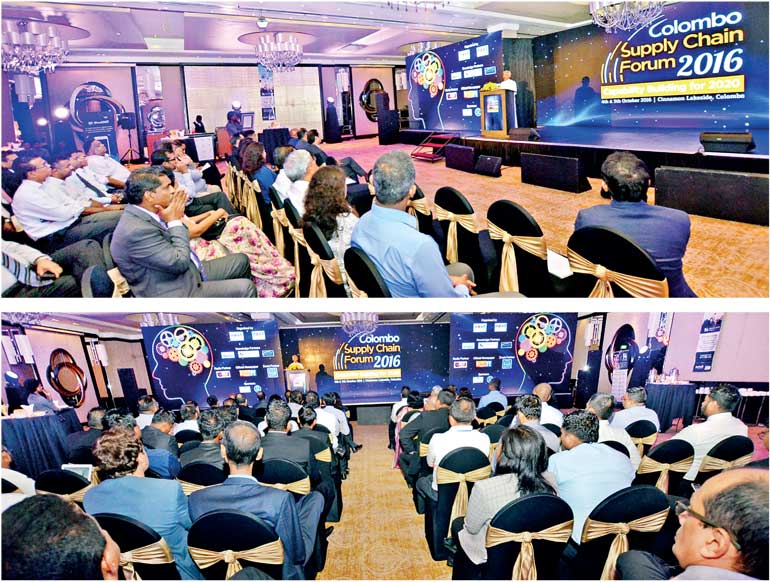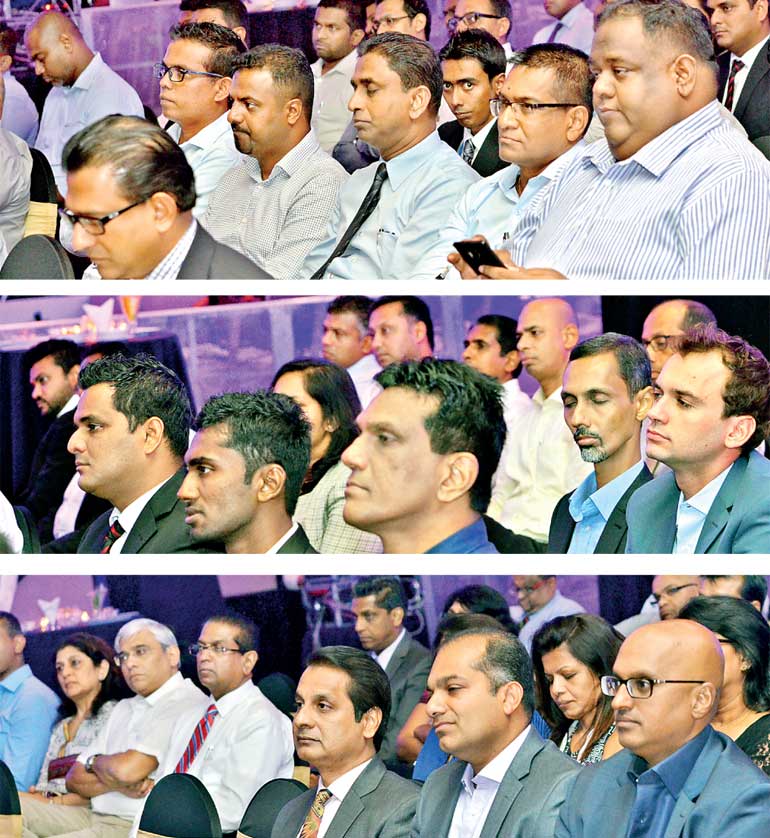Thursday Feb 19, 2026
Thursday Feb 19, 2026
Tuesday, 11 October 2016 00:03 - - {{hitsCtrl.values.hits}}
 Deputy Minister of State Enterprise Development Eran Wickramaratne
Deputy Minister of State Enterprise Development Eran Wickramaratne
By Himal Kotelawala
Using Sri Lanka’s unique position as port of last call for western-bound cargo, the country could be turned into an international supply chain hub in addition to being the oft-touted logistics hub, Deputy Minister of State Enterprise Development Eran Wickramaratne said.
“This is an advantage that we haven’t really capitalised on. It was less pronounced a few years ago than it is today, but now with the slowing down of economies in China and in East Asia, this becomes a real, competitive opportunity,” he said.
Delivering the keynote address at the CEO Forum of the Colombo Supply Chain Forum 2016 organised by the NEXT Institute of Supply Chain Management on Monday, the Deputy Minister identified three key challenges areas that are holding Sri Lanka back from making this a reality: Sustainable development, capability building and implementation.
Climate change is not understood widely enough, said Wickramaratne, recalling that Sri Lanka experienced the warmest two months in the country’s history in April and May this year.
While Sri Lanka is committed to ratifying the Paris agreement on climate change, more will need to be done.
“Ratification alone won’t change it. Countries have been asked to come up with their plans (for emission reduction). They have to show what their strategies are for carbon reduction targets,” said the Deputy Minister.
Deforestation was also an issue, said Wickramaratne, noting that in 20 years the country’s forest cover has gone down from 40% to 17%.
“We are destroying our own environment at a rapid pace. Companies in the plantation sector that were unable to meet their profit targets have been felling forests without any regard for their own children,” he said.
Explaining his reasons for bringing up the environment in a discussion about supply chain management, the Deputy Minister said that no development objective can be considered without looking at sustainability. When a company joins a supply chain, he said, it is imperative to ensure it doesn’t get the bad, unsustainable end of the chain.
When it comes to capability building, said Wickramaratne, while it is true that there is a shortage of labour in Sri Lanka, what needs to be examined is why there is a shortage and subsequently looking elsewhere for said labour.
If there is an available pool in labour, he said, it’s in agriculture 29% of SL’s labour pool, contributing only 10% country’s GDP, adding that people are moving out of the agriculture labour force at a rate of roughly 1.5% per annum.
In order to increase this rate, and for this labour pool to seek employment in other sector, there needs to be attractive returns on offer.
Another pool of labour that has yet to be tapped into, said Wickramaratne, is women. Though Sri Lanka has made great strides in this regard over the past 20 years, women’s unemployment and underemployement still remains at higher than desirable levels.
Despite the fact that women are doing significantly better than men at secondary and tertiary education – 60% of all undergraduates are women, for example – it isn’t necessarily translating into economic growth and participation of women in the economy, with only 65% of Sri Lankan women actively taking part, said the Deputy Minister.
“Some say it’s cultural, but I think it’s more to do with choices,” he said, alluding to familial responsibilities and attempts to maintain a work-life balance.
This is an area in which companies could be malleable in accepting that pool of labour.
“Company practise have to change so that these women could contribute not just to the fulfilment of their families but also to the country,” he said.
Implementation, more than anything else, is the biggest challenge faced by the country, said the Deputy Minister.
“Sri Lanka is not short on vision and plans, but terribly short on implementation,” he said.
While everybody was responsible to some degree, politicians should take a portion of the blame for their lack of consistency.
“Our government’s future is dependent on ability to attract foreign investment, so consistent policy is important,” said Wickramaratne.
However, he added, implementation is not the responsibility of the government. That, he said, is up to the private sector and the bureaucracy.

“Without exception businessmen will say SL bureaucracy has failed. We need a faster, efficient bureaucracy that will rival our South East Asian neighbours. Vietnam, Cambodia and maybe even Bangladesh have overtaken us,” he added.
The Deputy Minister identified compensation, remuneration, incentives, lack of key performance indicators (KPI), motivation and corruption as key issues in bureaucracy.
“There is no penalty for under performance in the public sector, and hardly a penalty for corruption,” he said.
There is a possibility, however, that some of these issues could get solved under his government, he said with some optimism.
“An independent judiciary has been making its judgements known. All these efforts will go into reducing corruption and make sure people follow the law,” he said.
The Deputy Minister further said that training and remuneration in the public sector have yet to be tackled by the Government, adding that priority will be given to it over the next few years.
The economic vision of the present Government, said Wickramaratne, is to create a commercial hub, and it proposes to do bring about this vision with an influx of investors and commercial establishments which will open the business landscape to international operators. “We’re very much at the start. Are our organisations ready and geared to go in this direction? Do organisations when exposed to external business undercurrents have the required structures in place to compete in the fast changing business environment?” he said.
Sri Lanka has generally been defensive when confronted with the idea of competition from India.
“Every time international competition is brought up or competition from our biggest neighbour next door, our defences tend to go up. There are many reasons generally thrown as to why we shouldn’t be allowing that kind of competition, often not really admitting that we’re not competitive,” said the Deputy Minister.
Companies need to examine whether they have the capability in process driven management disciplines to restructure organisations and take advantage of technology. They also need to understand the requirement to integrate upstream, downstream business processes with both internal and external stakeholders, and know how to manage the information flows. The geopolitical considerations that mandate them to operate within the constraints of environmental protection must also be taken into account, explained the Deputy Minister.
“The future of supply chains will be very different from what we see today,” he added.
To operate successfully internationally they have to be aligned with their international business counterparts, said the Deputy Minister.
“More recently we hear about global production networks. Parent companies who have a value chain and have identified production sources, they want control over those production sources,” he said, pointing to producer driven value chains and retailer driven value chains such as Nike, where the retailer tells the manufacturer what exactly they want.
“Vietnam and Thailand are ahead of us in terms of entering supply chain,” said the Deputy Minister, adding that it’s a time critical business.
“Sri Lanka got left out of the first phase because of the political instability and the military conflict,” he said.
However, after 2009 there are signs that this is changing, with the current political climate having made a difference. “Six years after the end of the conflict you could say with some level of confidence that our environment is more stable than some of the others in our region today,” he said.
One of the biggest challenges in supply chains is of scale. While it’s very difficult for Sri Lanka to get the Samsungs and the Toyotas of the world to come here, Sri Lanka could look at other avenues. “Yes, there is a shortage in terms of supply, but begs the question, why? People are unwilling to work for Rs. 20,000 a month. The least skilled workers seek for more. We are a lower middle income country, our living standards are relatively high and the aspirations of our workers are high. They value the balance between work and leisure and what that translates in terms of economic return,” said Wickramaratne.
“The demographics suggest that we’re an aging population in addition to a very low growth compared to the rest of our peers in South Asia,” he added.
Instead of looking at large scale productions, Sri Lanka could consider getting into niche products.
“Maybe look at small quantities at very high value, such as noise suppressers, sensors for vehicles,” he said.
The large foreign investors and flagship investments went to countries like Vietnam, he noted.
“It helped those countries, it upped their credibility just by those companies being there,” he said.
This was the story 15 years ago, though, and things have changed. Apparel companies like MAS and Brandix have made some progress in Sri Lanka. Emulating that success elsewhere, however, may be tougher than envisioned.
“If we’re to replicate this, it’s going to be difficult. Not impossible, but difficult. Maybe we can once or twice but I think we need to look at the bigger opportunity in the region. The big brands are already in the subcontinent. Can we supply components to India? We have the access, the transport and logistics costs should be acceptable and the advantage of timeliness,” said the Deputy Minister.
